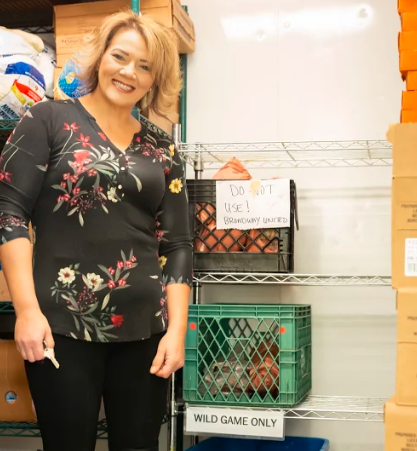In September last year, Shelter House announced that it became the first kitchen in Thunder Bay to receive a permanent permit to serve wild game.
Volunteer coordinator intern Katie Watson and human resources intern Melissa Scholz worked on the project for six months, presenting the Health Unit with a risk assessment and creating a system of documentation that would allow for traceability. As a result, Shelter House started receiving donations of wild game from hunters in the region, provided the meat is cleaned, processed and ready for cooking.
Since the announcement, a regular stream of hunters have dropped off donations, as many as two or three a day. Many more have called to ask how to donate wild game.
“There is a process. Only supervisors can accept wild game, and we need to know who the hunter is, where it was harvested, where it was processed, and it has to be packaged a certain way,” explains Michelle Jordan, the executive director of Shelter House. If hunters are not sure of the procedure, they can call Shelter House any time to ask.
When the donated wild game is dropped off, staff need to document them properly, in the unlikely event of an issue such as food poisoning, so that it can be traced back and the source determined.
Since the announcement, which coincided with hunting season, people have dropped off geese, deer, elk, fish and moose, according to Jordan.
“We had to get a separate chest freezer because we had so much of it,” she says. “Getting these donations have eased up the financial burden of buying meat. We didn’t have to order ground beef the past couple of times. That’s the only protein that we buy, that we can afford. So we hope to start seeing those savings. And that’s huge for us because we can use that money elsewhere.”
After a few months, the donations have started slowing down, but Jordan says that Shelter House is grateful to have donated wild-caught fish, not just meat.
So far, Shelter House has used the donated items to make familiar dishes such as stew and chilli. Some of the volunteer groups that cook the meals are a little intimidated by the idea of cooking with an ingredient they've never used before, while others welcome the opportunity.
“I’ve had volunteer groups specifically ask for it,” says HR coordinator Marsha Ledger. “Matawa are cooking tonight; they are making moose meat chilli with bannock and they asked in particular for moose meat. Some of our staff have asked for training to cook wild game, too.”
“A lot of the donors are Indigenous,” says Jordan, adding that Shelter House’s clients are also predominantly Indigenous and are very happy with the addition of more traditional foods in their meals.
“We try to target those who love the hunt more than the meat - the ones who often end up with excess meat that they give away anyway. Some hunters are talking about getting an extra tag so that they can donate a whole moose, for example, to Shelter House,” says Jordan.



